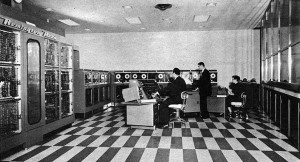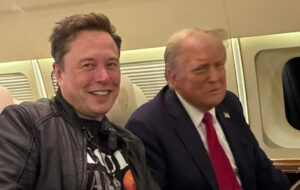I don’t think there are very many people my age who’ve ever expected much in the way of privacy online.
Oh, maybe in the very early days some might’ve naively figured that if they didn’t actually interact with a site, like if they just went to the New York Times to read an article or something, they were pretty private, but they soon learned about tracking cookies and hackers with keystroke logging tools and right away understood that everything done online might possibly be being observed.
My generation also understood from the get-go that if it was possible we might be being observed, we might as well figure that we are being observed.
This is something we learned decades earlier from the telephone.
Back in olden times when I was growing up, in the days before cell phones, when a vacuum tubed Univac computer with enough RAM to hold a thousand words filled an industrial sized room, when telephones were absolutely always land lines and were nearly always connected to the Bell System, you had two major choices when you ordered phone service. You could either get a private line, which is what everybody pretty much has today, or a party line, which means you shared your phone service with who knows how many of your neighbors.
For the first five or six years of my life, all I knew was the party line because that’s all that was available on the street where I lived. On my street, Ma Bell hadn’t yet run enough wires for people to have private lines.
A party line meant that whenever the phone rang you had to listen for the ring style, or cadence, to determine if the call was for your family or another family sharing the line. It also meant you never got too personal in your telephone conversations because you never knew what busybody might be listening-in on the connection. That busybodies did listen-in you were certain, because you often secretly listened to the calls of others yourself. Sometimes you and your siblings listened-in together, suppressing giggles.
Having a party line meant you didn’t expect too much privacy on the phone.
By the late 1960s, the party line had pretty much gone the way of the passenger pigeon. It still existed in some remote reaches of the country, still does I understand, but pretty much by then everybody had private lines. While a private line meant your neighbors couldn’t easily eavesdrop on your conversation, it didn’t necessarily mean your conversation was private, as every politically active hippie knew.
During my days hanging out in the unincorporated part of Los Angeles county called Sunset Strip and, later, being a part of the scene around St. Marks Place and 2nd Avenue in the East Village, my friends and I all knew that any serious phone conversation, unless it was payphone to payphone, had to be spoken in code. We talked a lot about “albums” back then and we never, ever, gave a sensitive address away. We knew to treat every phone call as if we were on a party line.
Which brings us to the second decade of the 21st century. Hardly anyone has a land line anymore and the obsolete feature phone you buy with “double minutes for life” at the Dollar General store has thousands of times more memory than the 1,000 words that defined Univac. Most of us now use smart phones that are measurably more powerful than the computing power NASA used to put humans on the moon.

Let me pose a question. If all the governments in the world and all the world’s corporations promise to never, ever again use the Internet to spy on people and we never, ever see any future evidence that spying is still being done, will that make it so? I would think it intelligent to assume not.
“Web” means interconnected, for better or for worse. Interconnected as in a global village. Or as in “resistance is futile, you will be assimilated.”
For your own protection, I advise you to see the Web as the World Wide Party Line and assume that everything you write in an email is being read by someone other than the recipient, that every conversation you have using VoIP is being recorded and analysed by persons in positions of authority over you and that every time you visit a “subversive” site someone with the government is taking note.
Now, go and have a wonderful day!
Christine Hall has been a journalist since 1971. In 2001, she began writing a weekly consumer computer column and started covering Linux and FOSS in 2002 after making the switch to GNU/Linux. Follow her on Twitter: @BrideOfLinux









It,s blatantly obvious you voted for Obama. Christine, your defeatace acceptance, is idiocy
“defeatist” – . Damn Mobile Keyboards and Browsers, they’re junk!
Defeatist acceptance? You obviously are reading something into this that isn’t there. And you obviously don’t know me even a little bit. 🙂
@Christine
I think your story is quite coherent.
We should assume we are under all circumstances being monitored.
The only tool Americans have to keep their business private is encryption.
RetroShare is one example of such applications which when used can ensure privacy.
Apply the same common sense rules for public conduct to the Internet. Don’t discuss your private affairs in social streams.
Anything which you don’t wish to have others see put under lock and key with services such as SpiderOak and Wuala which employ Zero-Knowledge encryption.
Be safe and have a great day.
Mwuahahahahahhahah…….
Your Linux Advocate
Dietrich Schmitz
Certainly, when placing a phone call in the pre-cell phone era, there could be no expectation that only persons listening on phones at the number called would be listening, and there could be no certainty that the government was not monitoring both ends of the conversation. Caller ID did not exist in the 1960s, so there was no way for anyone answering the phone being called to identify the caller without that caller’s cooperation. Those days are gone, as they should be; we have the right to know to whom we are talking when they call our phones.
However, it is not even necessary for us to use our phones for our privacy to be compromised. We only need to carry our phones with us. They are monitoring devices that track our location in real time, and the phone company keeps a convenient record of our movements for easy access by government and law enforcement agencies to use against us. All without notice or warrant in an alarming number of cases.
It is true that when placing phone calls in the 1960s that records of those calls could be used to narrow the location of a person to a particular address for the duration of the call, but tracking of that sort ended when the call ended. We could reasonably assume that our privacy was not continuously compromised.
But, that is no longer true, is it? Now, having a phone means constant monitoring not only of communications, but of physical movements with GPS accuracy. The Web and email are easily traceable, as they always have been. What is dramatically different is how our phones have become tools not for our use, but for the use of government against us.
@Scott You have pointed out a very big gripe of mine. Up until recent decades, no record whatsoever was made of a local phone call, except in a few cities like New York where local phone service rates were based on usage measured in “message units.” Since telephone switching was done through electro-mechanical switches and relays, to keep records would’ve required cumbersome equipment and would be considered to be a waste of money since they would be of little use.
The records that are kept now on all phone calls are very scary to those of us who value our privacy. They are very much a sign of encroaching Big Brotherhood and the blurring lines between government and big business.
I think you miss the mark, however, with caller ID. As any business owner can tell you, IDs can be spoofed about as easily as email address. I can’t tell you how many times I’ve answered the phone with the ID saying one thing, but finding a telemarketer on the other end.
Also, caller ID in no ways means that your telephone conversation isn’t being listened to by the authorities.
Your point about caller ID is true, and I have similar experience with it. My intended point was to say that caller ID attempts to deal with the problem of anonymous callers violating our privacy, not that it is always effective. When caller ID tells the other party who you are, it is less likely that you will behave abusively as if you have impunity. However, caller ID makes it far more likely that you know who is calling before you even decide whether to answer the phone. In the 1960s, all you got was a ringing sound. Now, even if the information is false, you either get a phone number, or you are told that the number is blocked. Either way, caller ID tells you something about who is calling, even if it does not definitively identify the caller, even if it is only that the other person does not want you to know who they are or that you don’t know the party calling, which is far more information than you could get about a caller in the 1960s while the phone was ringing. I certainly did not even imply that caller ID prevents authorities from monitoring conversations. On the contrary, my point was that they don’t even need to listen to our calls to monitor us.